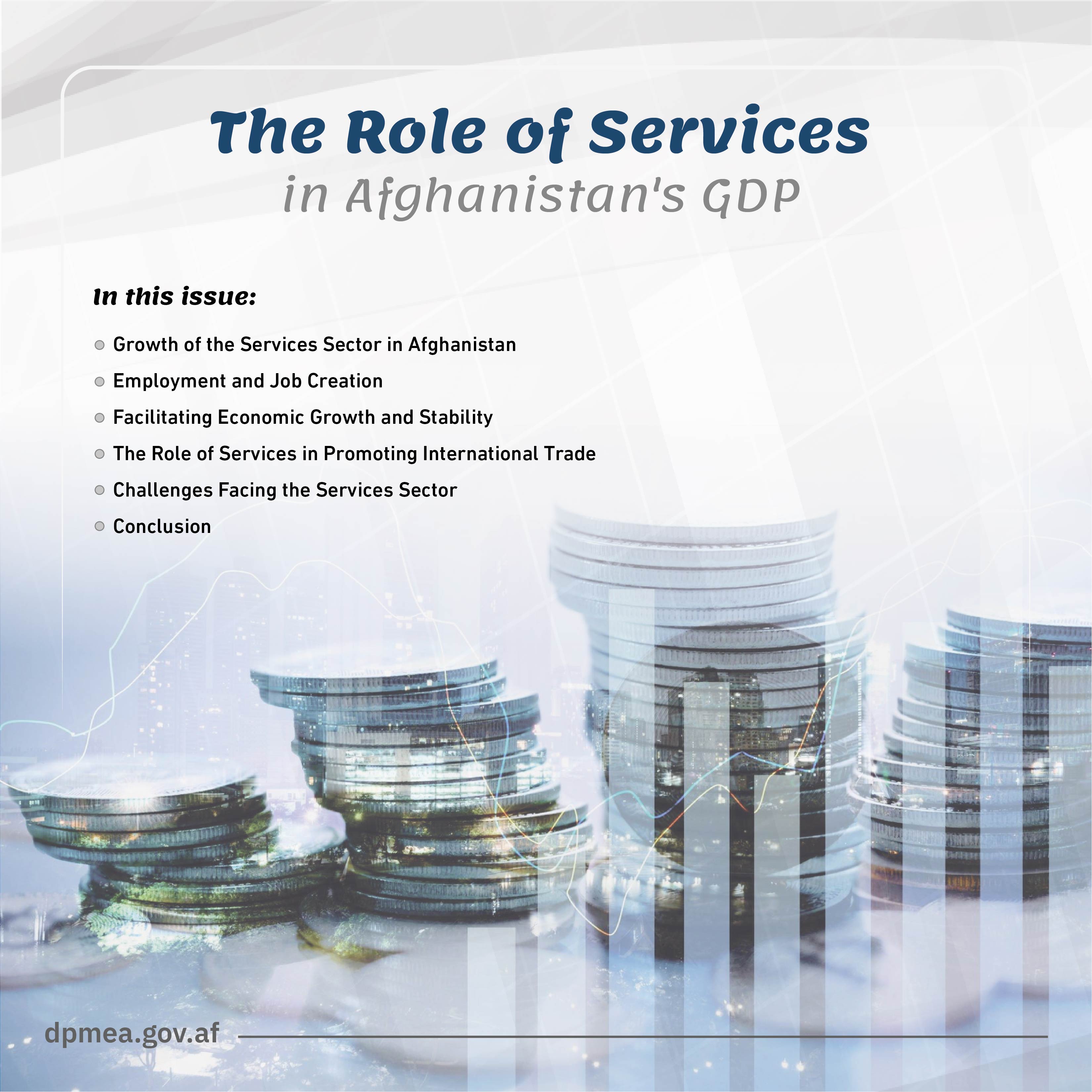The Role of Services in Afghanistan's GDP

By: Abdullah
Introduction
Afghanistan's economy has undergone significant changes over the past few decades, transitioning from a largely agriculture-based economy to one where the services sector is playing an increasingly important role. The services sector, which includes industries such as trade, transportation, communications, finance, healthcare, and education, is now a key component of Afghanistan's Gross Domestic Product (GDP). In this article, we will explore the role of services in Afghanistan's economy, examining how this sector contributes to economic growth, employment, and long-term development.
Growth of the Services Sector in Afghanistan
Historically, Afghanistan's economy has been dominated by agriculture. However, due to prolonged conflict, political instability, and global economic integration, the services sector has emerged as a major driver of economic growth in the past two decades. The post-3 year, saw an influx of peace and withdraw foreign forces, the establishment of infrastructure, and an expansion of private enterprise. This led to rapid growth in areas such as banking, telecommunications, trade, transportation, and public services.
Today, the services sector contributes to a significant portion of Afghanistan's GDP, estimated at around 50–55%. This shift reflects the broader global trend where services are becoming more central to economies as they modernize and urbanize. The growth of this sector in Afghanistan signifies the potential for diversification and resilience against agricultural volatility, which is subject to factors like weather and climate change.
Employment and Job Creation
One of the key roles of the services sector in Afghanistan’s economy is its contribution to employment generation. As the agricultural sector is often seasonal and labor-intensive, it cannot absorb the growing urban population in search of steady employment. The services sector has helped fill this gap, providing jobs across different industries such as banking, trade, transportation, and information technology.
The telecommunications industry, for example, has seen significant growth and now employs tens of thousands of people across the country. Similarly, the retail and trade sectors, both formal and informal, have expanded rapidly in urban areas, contributing to increased job opportunities. This expansion has been crucial in reducing unemployment, particularly for young people, who have increasingly entered the workforce in sectors such as healthcare, education, and hospitality.
Facilitating Economic Growth and Stability
The services sector also plays a critical role in facilitating broader economic growth in Afghanistan. For example, transportation and logistics are essential for connecting Afghanistan’s agricultural and industrial products to both domestic and international markets. With its landlocked geography, Afghanistan relies heavily on its transportation network for trade with neighboring countries like Pakistan, Iran, and Central Asian states.
Similarly, the financial sector has played a pivotal role in economic stability and growth. The development of a banking system and mobile money services has enabled people to access credit, save securely, and make investments, all of which contribute to domestic economic activity. Furthermore, services such as education and healthcare are instrumental in building a skilled and healthy workforce, which in turn enhances productivity and supports sustainable economic development.
The Role of Services in Promoting International Trade
Afghanistan's services sector is also key to its participation in international trade. Services such as telecommunications, transportation, and logistics are necessary for facilitating both imports and exports. Additionally, Afghanistan's strategic location as a crossroads between Central Asia, South Asia, and the Middle East offers significant potential for growth in trade-related services, such as customs, warehousing, and transit services. Projects like the TAPI gas pipeline highlight the importance of the services sector in integrating Afghanistan into regional and global trade networks.
Challenges Facing the Services Sector
Despite its growing role in Afghanistan’s economy, the services sector faces numerous challenges that must be addressed to unlock its full potential. underdeveloped infrastructure, including roads, telecommunications networks, and electricity supply, hinders the efficiency and expansion of many service industries.
The lack of skilled labor is another challenge, particularly in sectors like finance, healthcare, and education, where specialized knowledge is essential. Although educational reforms have improved access to basic education, there is still a significant gap in vocational and technical training needed to meet the demands of a growing services sector. Addressing these challenges will require both government action and international assistance to create a conducive environment for service-based industries to thrive.
Conclusion
The services sector plays a vital role in Afghanistan's GDP and is essential for its long-term economic development. As Afghanistan continues to urbanize and diversify its economy, services like transportation, finance, healthcare, and education will become even more central to its economic stability and growth. Despite facing challenges such as political instability and infrastructure deficits, the services sector offers a promising path toward economic recovery and development, providing opportunities for employment, trade, and sustainable growth. Prioritizing investments in this sector will be critical for Afghanistan's future economic resilience.